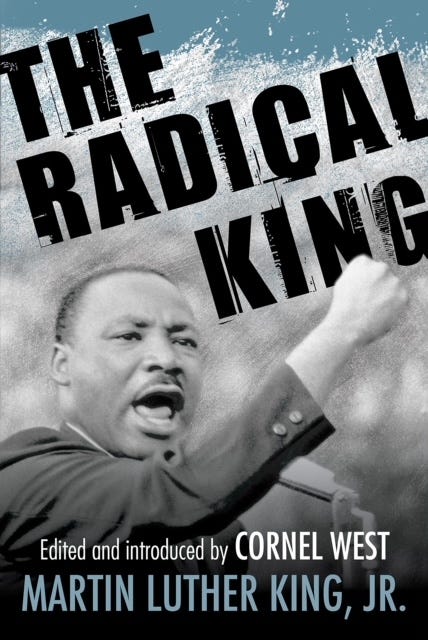The Radical King: “I’d Rather Be Dead Than Afraid”
Dr. Martin Luther King, Jr. is widely known as a man of deep compassion and wisdom. Through his philosophies, he advocated for everyday people thrown asunder by a bigoted, plutocratic world.
As the most prominent leader of the civil rights movement and despite his advocacy for nonviolence, King was radical at heart. That according to prominent Black intellectual Cornel West, editor of the book The Radical King, who argues that King’s revolutionary nature has been severely under-recognized and whitewashed throughout the canons of history.
Featuring four thematically crafted sections, The Radical King features twenty-three selections of sermons, orations, lectures, and prayers, exquisitely curated by Dr. West. As I read these stirring sermons and speeches, I was struck by King’s fearless resolve, energy, and vision.
But what really captured my attention throughout was the radical undercurrent underlying his thoughts and philosophies related to poverty, his unapologetic opposition to the Vietnam War, and the efforts to crush the ugly stain of global imperialism.
In the book’s introduction, West opines:
“Although much of America did not know the radical King—and too few know today—the FBI and US government did. They called him “the most dangerous man in America.” They knew Reverend King was a revolutionary Christian, sincere in his commitment and serious in his calling.
They knew he was a product of a black prophetic tradition, full of fire in his bones, love in his heart, light in his mind, and courage in his soul. Martin Luther King, Jr., was the major threat to the US government and the American establishment because he dared to organize and mobilize black rage over past and present crimes against humanity targeting black folk and other oppressed people.”
He notes that the true legacy of King is inextricably tied to his efforts “as an anti-colonial and anti-imperial thinker and fighter, as a defender of the poor, and as a preacher of the kind of radical love embodied in the life and ministry of Jesus of Nazareth.”
West says that King was neither “flawed, perfect nor pure in his prophetic witness – but he was the real thing in sharp contrast to the market-driven semblances and simulacra of our day.”
What irks West is how “the depressing spectacle every January of King’s “fans” gives us the sanitized versions of his life.” Yet, he points out that one of King’s favorite sayings was:
“I would rather be dead than afraid.”
As King once angrily said: “What you’re saying may get you a foundation grant, but it won’t get you into the Kingdom of Truth.”
King in a radical way pushed aside popularity in his quest for moral and spiritual influence tied to his deep love of everyday people, especially in light of the over 400 years of violent struggle faced by Black Americans.


